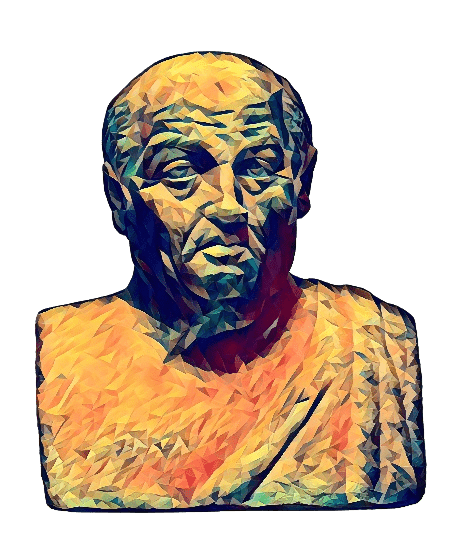All about Stoicism: origin, essence and beliefs
Stoicism has recently experienced a major revival. Many people turn to this philosophical school of thought in the hope of finding meaning in life. But: what exactly is Stoicism and how did it come about? The philosophy of Stoicism has been around for centuries, and its main tenets still apply today. Famous Stoics like Socrates, Seneca, and Marcus Aurelius contributed a lot to the philosophy, and their teachings are still studied and applied by people all over the world. If you want to learn more about Stoicism or apply its principles to your own life to become happier and more serene, read on! In this article you will learn everything you need to know about Stoicism, from its history to its modern applications.
My first contact with the term "stoic" was in my early teens - which feels shockingly far away. My mother said to me, "Don't be so stoic!". Although I can't remember what it was about, it's no surprise that she said that to me. I had a tendency to not be impressed by things that were happening around me or to me. I didn't understand the term, but I also didn't bother to ask what it meant or look it up myself (definitely not a stoic approach!), but I associated it with something negative. And so the term remained with a negative connotation in my mind for more than a decade. A few years ago, my old supervisor at work, named Boban, said to me, "I bet you love the Stoics, right?" because we often talked about philosophical topics. And my response was unreflective and defensive, "Certainly not." But boy have things changed since I said that.
When I was a few years older and more mature (though not by much), curiosity gripped me and I began to research the subject of Stoicism in depth and my opinion changed. Drastically. True, I had learned more about the Stoics between my teenage years and the conversation with my colleague, and had an image in my head of old men living lives devoid of joy and a sense of wonder. Now I know how short-sighted that was, but also that many people see the Stoics that way.
What is Stoicism and how did it begin
I had and many others (maybe even you) have a wrong impression of what stoicism is. But that's no big deal, because we're going to explore the topic in more detail now.
What is Stoicism?
Stoicism was a school of thought that emerged in Greece in the early third century BC. Its adherents believed in making decisions with reason and logic and living in harmony with nature. The philosophy was founded by Zeno of Citium, who was influenced by the Cynics. The name "Stoic" comes from the Stoa, a porch in the Agora of Athens where Zeno taught. There are different interpretations of what it means to be stoic. For some, it is about remaining calm and unemotional in the face of adversity.
Others see it as a way to live in harmony with nature or to control oneself. The Stoics believed in making decisions with reason and logic.
They believed in self-control, living in harmony with nature, and making rational decisions. The philosophy was founded by Zeno of Citium, who was influenced by the Cynics.
Why is Stoicism often misunderstood?
It is quite easy to interpret Stoicism as a joyless worldview in which one must endure pain stoically. This interpretation stems primarily from a misunderstanding of what the Stoics meant by "passions." For the Stoics, passions are any strong feelings that cause us to lose our reason and self-control. These can be things like anger, fear, jealousy, and lust. The Stoics believed that we should strive to be free of these passions because they cause us to act irrationally.
Therefore, many people think that Stoicism teaches to stay away from joyful activities and emotions.
However, this is not an accurate portrayal of Stoic philosophy, for it lacks many details: while it is true that the Stoics believed in enduring pain and hardship stoically, they also believed in living life to the fullest and enjoying its pleasures. It is this balance between pleasure and pain that makes Stoicism such a unique and interesting philosophy.
This school of thought is far too complex to cover all of its nuances in a single blog post, but I hope we've been able to give you an overview of what it is and how it came to be. In the next section, we'll take a closer look at the founder of Stoicism.
Who founded Stoicism and why?
As already mentioned, the Stoic school was founded by Zeno from Citium founded, but who was this man?
Zeno was born around 334 BC to a wealthy Phoenician family in Citium, Cyprus. As a young man, Zeno was shipwrecked on the coast of Athens and decided to stay there and study philosophy with various teachers, including the Cynic Krates of Thebes. It is believed that his time with the Cynics had a significant influence on his own philosophy.
After a few years of study, Zeno began teaching in the stoa, the porch in the Agora of Athens, which is why he and his followers became known as Stoics. (The word Stoic comes from the Greek stoa, meaning "porch.") His lectures were so popular that they attracted students from all over the Greek world, including the famous philosopher Aristotle.
Over the years, Zeno and his followers developed the Stoic philosophy, which they believed could be used to live a happy and virtuous life.
In this way, Stoicism became one of the most influential schools of thought in the Greek and Roman world. Key figures such as Cato the Younger, Seneca, Epictetus, and Marcus Aurelius later helped shape and spread Stoic philosophy - and which we will examine in more detail later.
The philosophy of Stoicism and its main principles
Now that we know a little about the history of Stoicism, let's take a look at its main principles.
One of the most important Stoic principles is the idea of the "Living in harmony with nature". This does not mean that we live in harmony with the natural world around us (although that is part of it, of course), but rather that we live in harmony with the nature of things. In other words, we accept the things we cannot change and work to change the things we can.
Another important Stoic principle is the idea of the "Living in the present moment". This does not mean denying the past or the future, but living in the present moment and making the most of it.
The Stoics also believed that we should let reason and logic guide our actions. This does not mean that we should never act on feelings, but that we should let our feelings be guided by reason.
The Stoics believed in the Self-control, that is, to the ability to control our emotions and desires. This does not mean that we suppress our emotions or desires, but that we control them and use them in a constructive way.
Finally, the Stoics practiced Stoic Detachment, that is, in the ability to detach ourselves from our emotions and desires. This does not mean that we should never have emotions or desires, but that we should be able to detach ourselves from them and not be controlled by them.
Amor Fati, or "love of fate," is a Stoic principle that encourages us to accept the things that happen to us, even the bad things. This does not mean that we should be passive and accept everything that happens to us, but rather that we should accept the things that happen as part of life and work to change the things we can.
Sympatheia, or "compassion," is another Stoic principle that encourages us to see ourselves as part of the human community and to care for others. This does not mean that we should sacrifice our own happiness for the sake of others, but rather that we should be aware of the interconnectedness of all people and act in a way that helps the community as a whole.
Prosopon, or "person," is a term used by the Stoics (and other philosophical schools) to mean that each person has a calling or a role to play in life. This does not mean that we should all strive to be the same, but rather that each of us has something unique to offer the world.
Dike, or "justice," is a Stoic principle that encourages us to act justly and fairly in all aspects of our lives. This does not mean that we should blindly follow the law, but rather that we should act in a way that is fair and just, even when the law does not require it.
Arete, or "virtue," is a (and according to expert Ryan Holiday of dailystoic.com perhaps the most important) stoic value that encourages us to live virtuously. This does not mean that we should strive to be perfect, but rather that we should strive to live to our highest potential.
Daimon or "divine spark" is a Stoic principle that encourages us to see the divine spark in all people and things. This does not mean that we should worship other people or things, but rather that we should see the good in all people and things.
„Memento Mori" or "remember death" is a Stoic principle that encourages us to remember our mortality. This does not mean that we should live in fear of death, but rather that we should live in awareness of death and use it as motivation to live our best lives.
All of these principles (and many others) are important aspects of Stoicism that can help us live happier and more peaceful lives. While the history of Stoicism is long and complex, the main principles of the philosophy are relatively simple and easy to understand. While Stoicism may not be for everyone, it is a philosophy worth considering if you are looking for ways to improve your life. But before we take a look at the practical application of Stoicism in modern life, let's take a look at the most famous Stoic figures.
Famous Stoics in History and their Contribution to Philosophy
This list is not in chronological order, but is intended to represent how well known the various Stoics are:

Lucius Annaeus Seneca was a Roman Stoic philosopher, statesman and playwright. He was born in Spain and his family moved to Rome when he was young. He became a successful lawyer and politician and was eventually appointed tutor to the future Emperor Nero. Seneca is one of the most famous Stoics and his writings were very influential. His life came to a tragic end, as he was later forced to take his own life after being found guilty in court.
Seneca explains: Navigating through life the right way
Marcus Aurelius was a Roman emperor and Stoic philosopher. He was born in Rome to a wealthy and powerful family. He became emperor in 161 AD and ruled for 19 years. Marcus Aurelius is one of the most famous Stoics and his book, the Meditations, is one of the most important works of Stoic literature.
Marcus Aurelius' Most Relevant Quotes for Modern Life
Epictetus was a Greek stoic philosopher. He was born a slave, but was later freed. He lived in Rome for many years and taught Stoicism to Emperor Marcus Aurelius. Epictetus is one of the most famous Stoics and his book, The Enchiridion, is one of the most important works of Stoic literature.
Epictetus on true wealth and frugality

Zeno from Citium was a Greek Stoic philosopher. He was born in Citium (modern Cyprus) and moved to Athens in his youth. He founded the Stoic school of philosophy and his teachings were accordingly very influential and still haunt us today.
The time of the present is limited - Zeno
Cato the Younger was a Roman politician and stoic philosopher. He was born into a wealthy and powerful family. He opposed Julius Caesar and was eventually killed by Caesar's troops. Cato is one of the most famous Stoics and his Stoic death is often cited as an example of Stoic courage.
These are just a few of the most famous Stoics in history. There are many other Stoics who have made important contributions to philosophy. But now let's look at how we can apply Stoicism to our lives.
If you want to learn more about the Stoics mentioned or about other philosophers, this article is for you: Briefly introduced: The most famous philosophers
How to apply stoicism in your life to become happier and more serene
We have already looked at some of the main principles of Stoicism. Now let's look at how we can apply them in our lives.
Improve your perception: The Stoic philosopher Epictetus once said: "It's not the things that bother us, it's our opinion about things." This is a very important stoic principle that we can apply in our lives. We should not be disturbed by external things or events, but focus on our own opinion and attitude.
How you can practice this in your everyday life:
- The next time something negative happens, take a step back and try to look at it from a different perspective.
- Try to find the positive in every situation and learn from your mistakes.
- Focus on the things you can control and let go of the ones you can't.
Another of the most important stoic principles is the Acceptance of what is: This principle is known as "Amor Fati" known. This Latin phrase means "love of destiny". It reminds us that we should accept whatever happens to us. We should not try to resist what is natural or what is beyond our control. Instead, we should accept it and make the best of it.
This does not mean that we should accept everything that happens to us without trying to change it. It means that we should accept the things we cannot change and focus on the things we can change.
How you can practice this in your everyday life:
- The next time something bad happens, try to accept it and see it as an opportunity to learn and grow.
- Focus on the things you can change and make a plan to change them.
- Try to be positive and optimistic about the future.
Another stoic principle is that of the "Living in harmony with nature": This means that we should live our lives in a way that is in harmony with the natural world and our own human nature. We should not try to fight or resist what is natural, but rather accept it and Virtue is the only good. This stoic principle reminds us that we should focus on our own character and virtue, not on external things or events. Our own character is the only thing we can really control. And if we focus on developing our own virtue, we will be happier and more content regardless of what happens to us externally.
How you can practice this in your everyday life:
- Focus on developing your own character and virtue.
- Try to be honest, fair and courageous.
- Practice self-control and stoic serenity.
- Focus on your own actions and intentions and not on external things.
The Stoic philosopher Marcus Aurelius once said: "You have power over your mind - not over external events. Realize this, and you will find strength." This stoic principle reminds us that we should focus on our own thoughts and attitudes, not on external events. We cannot control what happens to us on the outside, but we can control our own thoughts and attitudes. And if we focus on controlling our own thoughts and attitudes, we will be happier and more content regardless of what happens to us on the outside.
How you can practice this in your everyday life:
- Focus on controlling your own thoughts and attitudes.
- Try to become aware of your own thoughts and feelings.
- Practice stoic composure toward your thoughts and feelings.
- Focus on living in the present moment.
Honesty is the best policy: This stoic principle reminds us that we should always be honest with ourselves and with others. Honesty is a virtue and it is always better to be honest than to try to deceive others.
How you can practice this in your everyday life:
- Always be honest with yourself and with others.
- Do not try to deceive others.
- Be open and transparent in your communication with others.
-Practice stoic distance from the opinions of others.
These are just some of the ways we can apply Stoicism to our lives. By following these principles, we can live a happier and more content life. Stoicism is a very old philosophy, but it is still relevant and applicable today.
The advantages and disadvantages of a stoic lifestyle
There are both advantages and disadvantages to adopting a stoic lifestyle and philosophy. Let's take a look at some of the most important ones.
Advantages of Stoicism:
Some of the advantages are:
- You learn to focus on what is insideOne of the most important principles of Stoicism is to focus on what you have control over. This means that you learn to let go of things that are out of your control. For example, you can't control what other people think or say about you. But you can control how you react to them. By accepting what is out of our control and working on ourselves, we can live happier and more content lives.
- You will be less attached to things and more satisfied with what you have: Stoic philosophy teaches us to be content with what we have. We should not strive for things that are unattainable for us or that are not necessary for our happiness. For example, we may want the latest iPhone, but we don't need it.
- You become more resilient to life's ups and downsOne of the main goals of Stoicism is to make you more resilient. This means that you will be better able to handle the difficult times in your life. Also, you will be less likely to let your emotions control you.
Did you know that the powerful Roman emperor and stoic philosopher Marcus Aurelius lost his wife and child? He accepted this stoically and continued to lead Rome through difficult times.
- You develop a better understanding of what is really important in life: Stoic philosophy helps us to realize what is really important in life. This means that we can focus our time and energy on things that are more important than trivial matters.
The disadvantages of stoicism (and how to avoid them)
First of all: This Cons are Can. It's not necessarily that these drawbacks will become a thing in your life. Usually, you don't have to worry about them - if you keep educating yourself and reevaluating, as any good stoic should.
The possible disadvantages of a stoic lifestyle include:
- You might become more stoic than is healthy or useful: Poor stoic practice can cause you to suppress your emotions instead of dealing with them constructively. This can lead to problems in your personal relationships. It is important to remember that stoicism is not about becoming emotionless. Instead, it's about learning how to deal with our emotions in a constructive way.
- You might become too resigned to what is happening to you and stop striving for improvement: Stoicism can seem a bit controversial if we don't look into it more deeply. It's common to think that we should blindly accept everything that comes our way and that we don't need to improve ourselves, our lives, or the world around us. But this is far from what Stoicism teaches: remember how we talked about learning to distinguish between what we can influence and what we can't? This is where it becomes relevant: Of course, we should try to improve the things we can influence and over which we have control. For example, our character, our abilities, and our relationships. Ultimately, Stoicism is about virtue, and that definitely includes doing your best. Everywhere.
- You might distance yourself too much from things and lose sight of what is really important in lifeYour relationships, passions, etc. may suffer if you become too stoic. It is important to find a balance between detachment and commitment. You could become overly rational and lose touch. Remember: If Stoic philosophy meant not getting involved in everything, Zeno of Citium would not have founded the school of Stoicism, Marcus Aurelius would never have ruled over the Roman Empire, and Seneca would not have stood up for his beliefs that eventually forced him to end his own life.
Disadvantages beyond your control (how your social circle might perceive you):
- Can be considered cold or emotionlessPeople may see you as emotionless or apathetic. This is a misinterpretation on their part and you can't guarantee that it will never happen. But you can definitely see such situations as an opportunity to rethink your behavior and yourself: "Do I really come across as emotionless? Why is it like that? Do I want to change this? What can I do to change this?".
- May have negative connotationsSome people see stoicism as something negative because they misunderstand it. They think, for example, that stoics are unfeeling or apathetic. What can you do about this? You can ask questions. Asking questions is incredibly powerful and we tend not to ask enough. Once you know what they're thinking, you can start explaining if you want. You can of course also share this article 😉
- May be associated with a difficult pastIf you've been through hard times, people might see stoicism as a way of coping with your difficult past. Stoicism can help you deal with your past, but it's not the only way or necessarily the best way to do so - and it would never claim to be some kind of holy grail. Still, it is an incredibly powerful way to live a better life.
You can see that the advantages and disadvantages of Stoicism are quite balanced. It all depends on how you apply the philosophy in your life. If you apply it in a constructive way, stoicism can be a very powerful tool for achieving greater happiness and peace of mind. If you use stoicism as an excuse to suppress your emotions or not make an effort to improve, it will undoubtedly have negative consequences for your life.
Now that we've learned the basics of Stoicism, let's look at how you can apply Stoicism to your life to become happier and more serene.
Why Stoicism is still relevant today
The Stoic philosophers of ancient Greece and Rome had a good idea. And Stoicism is still relevant today.
Why? Stoicism is still relevant today because it provides a framework for living a good life. If you've read the article this far, you'll probably understand why this is more than just a bold statement.
Of course, you won't know how powerful it really is until you start practicing it. It's not easy to completely change your mindset and worldview. But if you are willing to make the effort, stoicism can have a profound impact on your life.
There are many Stoic principles that are still relevant today. For example, the Stoic principle of "living in harmony with nature." This principle is as relevant today as it was 2000 years ago. The Stoics believed that we should live in harmony with nature and not strive to dominate it. This principle is just as relevant today, in the age of climate change and environmental degradation.
Another Stoic principle that is still relevant today is the principle of "living in the present moment." This principle was advocated by the Stoics because they believed that it is the only thing we can control. And it is still true today. We cannot control the past or the future, but we can control the present moment.
The stoic principle, "live in harmony with others", is still relevant today. In an increasingly polarized world, it is more important than ever to try to understand and empathize with others.
As you can see, Stoicism is still relevant today because it provides a framework for living a good life. If you are willing to make an effort, Stoicism can have a profound impact on your life.
But I have to admit: even if you only apply a few small parts of stoicism in your life, it can still have a positive impact.
For example, when you start practicing negative visualizations, you automatically become more grateful for what you have.
When you start practicing stoic meditation, it will help you become more aware of your thoughts and feelings.
You may think that those were different times back then, but actually times weren't that different when it comes to how people felt, how they struggled, and what they had to deal with. As Marcus Aurelius once said:
"Look back at the past with its changing empires that rose and fell, and you can also foresee the future."
- Marcus Aurelius, Meditations
Stoicism resources for further reading
Stoicism is a practical philosophy that can be applied in our modern lives. It helps us focus on what we have under control and let go of what is not. It teaches us to deal with difficult situations and emotions in a constructive way. Stoicism also encourages us to live in harmony with nature and to accept what is beyond our control. If you want to learn more about Stoicism, there are many resources you can read.
We have an in-depth article on the best Stoicism beginner books, as well as a list of Stoic reading for those who want to go deeper (The 7 Best Books for Stoicism Beginners).
But if you're in a hurry, we have some other useful stoicism resources for you:
- A Handbook for New Stoics: How to Thrive in a World Out of Your Control-52 Week-by-Week Lessons by Massimo Pigliucci and Gregory Lopez
- How to Be a Stoic: Using Ancient Philosophy to Live a Modern Life from Massimo Pigliucci
- SUMMARY OF The Art of Living The Classical Manual on Virtue, Happiness, and Effectiveness - A New Interpretation by Sharon Lebell of Epictetus
You see, Stoicism is still very relevant today and can be beneficial to anyone who wants to live a happier and more peaceful life. IF you know what it really means and how it is actually practiced. Which you do now at the latest.
We hope you enjoyed reading this article. If you have any questions or feedback, let us know in the comments below. We look forward to hearing from you 🙂







